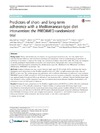Please use this identifier to cite or link to this item:
https://accedacris.ulpgc.es/jspui/handle/10553/52504
| Title: | Predictors of short- and long-term adherence with a Mediterranean-type diet intervention: the PREDIMED randomized trial | Authors: | Downer, Mary Kathryn Gea, Alfredo Stampfer, Meir Sánchez-Tainta, Ana Corella, Dolores Salas-Salvadó, Jordi Ros, Emilio Estruch, Ramón Fitó, Montserrat Gómez-Gracia, Enrique Arós, Fernando Fiol, Miquel García De-la-Corte, Francisco Jose Serra Majem, Luis Pinto, Xavier Basora, Josep Sorlí, José V. Vinyoles, Ernest Zazpe, Itziar Martínez-González, Miguel-Ángel |
UNESCO Clasification: | 3206 Ciencias de la nutrición | Keywords: | Dietary adherence Dietary intervention Dietary predictors Long-term dietary adherence Mediterranean Diet, et al |
Issue Date: | 2016 | Journal: | International Journal of Behavioral Nutrition and Physical Activity | Abstract: | Background: Dietary intervention success requires strong participant adherence, but very few studies have examined factors related to both short-term and long-term adherence. A better understanding of predictors of adherence is necessary to improve the design and execution of dietary intervention trials. This study was designed to identify participant characteristics at baseline and study features that predict short-term and long-term adherence with interventions promoting the Mediterranean-type diet (MedDiet) in the PREvención con DIeta MEDiterránea (PREDIMED) randomized trial. Methods: Analyses included men and women living in Spain aged 55-80 at high risk for cardiovascular disease. Participants were randomized to the MedDiet supplemented with either complementary extra-virgin olive oil (EVOO) or tree nuts. The control group and participants with insufficient information on adherence were excluded. PREDIMED began in 2003 and ended in 2010. Investigators assessed covariates at baseline and dietary information was updated yearly throughout follow-up. Adherence was measured with a validated 14-point Mediterranean-type diet adherence score. Logistic regression was used to examine associations between baseline characteristics and adherence at one and four years of follow-up. Results: Participants were randomized to the MedDiet supplemented with EVOO (n = 2,543; 1,962 after exclusions) or tree nuts (n = 2,454; 2,236 after exclusions). A higher number of cardiovascular risk factors, larger waist circumference, lower physical activity levels, lower total energy intake, poorer baseline adherence to the 14-point adherence score, and allocation to MedDiet + EVOO each independently predicted poorer adherence. Participants from PREDIMED recruiting centers with a higher total workload (measured as total number of persons-years of follow-up) achieved better adherence. No adverse events or side effects were reported. Conclusions: To maximize dietary adherence in dietary interventions, additional efforts to promote adherence should be used for participants with lower baseline adherence to the intended diet and poorer health status. The design of multicenter nutrition trials should prioritize few large centers with more participants in each, rather than many small centers. Trial registration: This study was registered at controlled-trials.com (http://www.controlled-trials. com/ISRCTN35739639). International Standard Randomized Controlled Trial Number (ISRCTN): 35739639. Registration date: 5 October 2005. Trial design: parallel randomized trial. | URI: | https://accedacris.ulpgc.es/handle/10553/52504 | ISSN: | 1479-5868 | DOI: | 10.1186/s12966-016-0394-6 | Source: | International Journal of Behavioral Nutrition and Physical Activity [EISSN 1479-5868],v. 13 (1), article number 67, (Junio 2016) |
| Appears in Collections: | Artículos |
SCOPUSTM
Citations
59
checked on Jun 8, 2025
WEB OF SCIENCETM
Citations
58
checked on Jun 8, 2025
Page view(s)
85
checked on Feb 17, 2024
Download(s)
80
checked on Feb 17, 2024
Google ScholarTM
Check
Altmetric
Share
Export metadata
Items in accedaCRIS are protected by copyright, with all rights reserved, unless otherwise indicated.
